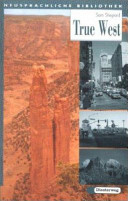 South Camden Theatre Company’s production of Sam Shepard’s TRUE WEST rocked audiences with its intensity and powerful performances primarily by the play’s leads, Jason Cutts as “Lee” and Patrick Alicarlo as “Austin”. The cameos by Breen Rourke and Kris Andrews provide the right touch as well.
South Camden Theatre Company’s production of Sam Shepard’s TRUE WEST rocked audiences with its intensity and powerful performances primarily by the play’s leads, Jason Cutts as “Lee” and Patrick Alicarlo as “Austin”. The cameos by Breen Rourke and Kris Andrews provide the right touch as well.
Robert Bingaman’s set is perfect. Andrew Cowles’ lighting design contains beautiful sunrises and sunsets, and Josh Wallenfels’ great sound pulls us even more into the house in the desert.
TRUE WEST is the story of two brothers who come home to where they grew up–about 40 miles outside of Los Angeles—in one of the many desert family communities. The brothers share little in common: Austin has lived a “normal” life having gone to college, gotten married, etc., while Lee has survived the desert and in life, primarily by being a thief. Dad is a drunk and lives somewhere in the Sonoran desert near Juarez, Mexico.
While his mother is on an Alaskan cruise, Austin, an accomplished screenwriter from the city, is house-sitting for her, and his brother drops by to prey on the neighbors’ household appliances. Austin objects to Lee’s intentions, but eventually allows him to stay–if he is out of the house when a film producer arrives that afternoon. Lee returns from a heist while the producer is still there. Instead, he talks the producer into a playing golf and looking at an outline based on an idea he has for a screenplay. Austin helps his brother with the outline, but not without humiliating his brother by overstating his own successes.
The next day, Lee returns jubilant after gambling on the golf game to get the producer to drop Austin’s project and produce his.
You can imagine the sparks that fly next. Sam Shepard is one of America’s most prolific and celebrated playwrights with his work fitting a variety of stages. Shepard, known for narration in his plays, uses short quips and retorts to send his message this time, but the message is as powerful as always.
Why does Shepard place his story about sibling rivalry among other things in the desert location? It seems distance and their mother may be buffers between the brothers’ polarity. They seem to be trying, quite literally, to bust each other’s head in. Lee, of course, leaning more toward his dad’s side, argues vehemently that Austin couldn’t survive in the desert or steal a toaster. This time, Austin is on the defensive. Each tries to emulate the other, but there is no connection. Is that the message? Maybe we are supposed to be who we are for ourselves and no one else. Or, do we need a buffer, too?
Although their father never shows up, he is at the heart of the play. One brother refuses to be anything at all like his father, while the other is already showing signs of the same pattern in his life. Shepard’s plays continually pick at the father-son relationship. In this case, the sons are “bound by fate” to follow the father however dismal the future.
Despite Robert Bingaman’s realistic scene design (and it’s a good one), the emotional intensity of the brothers’ battles ensure that this production is not realistic, and stays on point. Even with the outstanding sound and lighting effects that draw us into the scene. We are stuck there as the brothers are, tied to home, the last place we knew who we were. If anyone yelled at us, the way these two carry on, we’d leave the house or call the police.
While the play could be played with less volume —especially in a small house—and still work, I’m glad director Christopher “Jumbo” Schimpf chose to go with the playwright’s intention, which I think, gives energy to his message.
What we might think, Shepard realizes and makes us see. Sam Shepard’s plays, like any good playwright’s, are not about the stories he or she tells.
TRUE WEST is full of symbols, motifs and meaning, but it is also quite entertaining. It is a dark comedy, but so full of emotion that it doesn’t feel like it. Remember, it is not a farce, but a Human Comedy, so you can expect it to affect you deeply. Bring tissues. The play is funny, sad, angry and full of despair at times.
The South Camden Theatre Company production of TRUE WEST does a great job of reminding us that we, too, can fall victim to what people say, and that we should strive to be true to ourselves. The acting performances alone are worth the price of a ticket, but you should go for the whole deal.
TRUE WEST
Written by Sam Shepard
Directed by Christopher “Jumbo” Schimpf
April 25 – May 11, 2014
Fridays and Saturdays at 8:00 p.m.
Sundays at 2:00 p.m.
South Camden Theatre Company
Waterfront South Theatre
400 Jasper Street
Camden, NJ 08104
866-811-4111
http://www.southcamdentheatre.org
Originally posted by Jack Shaw for STAGE Magazine.
Check out this video with Gary Sinise and John Malkovich.





